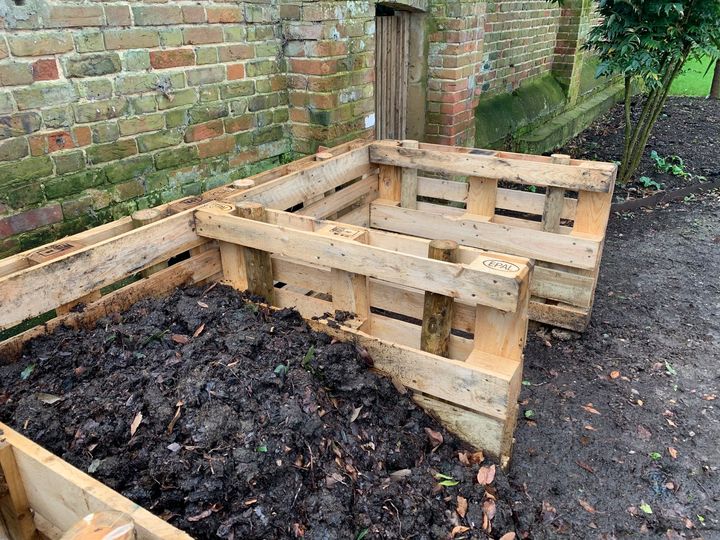Composting your garden leaves

We have created you a few notes on composting your garden leaves including the oak leaves
- You could create a number of smaller compost heaps around the garden using old builders pallets to save time ( see picture )
- When composting leaves mix with some other organic matter such as horse manure or lawn clippings
- Add some garden lime and growmore fertiliser as you build up the layers of compost
- Water to keep the compost moist
- Add a few composting works
- In the early winter cover with old carpet to sheeting to help keep the heat in over winter speeding up the composting bacteria
- When creating a new compost heap save or move some of the old compost to transfer the bacteria etc to the new compost
Unlocking the Potential of Oak Leaves: Composting Tips and Tricks
When autumn paints the landscape with hues of gold and amber, oak trees shed their leaves, carpeting the ground in a rich tapestry of foliage. These iconic leaves are known for their high tannin content, which imparts them with a characteristic acidity. While this unique composition makes oak leaves challenging to compost, it’s not an impossible feat. With a few clever techniques and the right ingredients, you can turn these golden treasures into rich, nutrient-dense compost for your garden.
The Challenge of Composting Oak Leaves
Oak leaves, with their tannin-rich composition, can be a bit stubborn in the composting process. Tannins are natural compounds that can slow down decomposition, making oak leaves one of the tougher materials to break down in a compost pile. Without intervention, they can take an extended period to fully decompose.
The Key Ingredients
- Grass Clippings: Grass clippings are a fantastic addition to your compost pile, especially when dealing with oak leaves. They introduce a healthy dose of nitrogen, balancing out the carbon-rich leaves. This accelerates the decomposition process and ensures a more balanced compost.
- Garden Lime: Oak leaves, being acidic, benefit greatly from the addition of garden lime. Lime helps neutralise the acidity, creating a more favourable environment for microorganisms responsible for decomposition. This aids in expediting the breakdown of the leaves.
- Growmore Fertilizer: A balanced fertiliser like Growmore can provide essential nutrients that support the activity of composting microbes. It supplements the composting process, ensuring that the resulting compost is nutrient-rich and beneficial for your plants.
- Composting Worms: Introducing composting worms, such as red wigglers, can significantly enhance the composting process. These diligent workers help break down tough materials like oak leaves, and their castings add valuable nutrients to the compost.
The Composting Process
- Layering: Begin by creating a well-balanced compost pile. Layer the oak leaves with grass clippings, aiming for a roughly 75/25 ratio of brown (carbon-rich) to green (nitrogen-rich) materials.
- Adding Lime and Fertilizer: Sprinkle garden lime and Growmore Fertilizer in moderate amounts as you build your compost pile. These additions will help neutralise acidity and provide essential nutrients for the microorganisms.
- Incorporating Composting Worms: Introduce a healthy population of composting worms into your pile. These worms will work tirelessly to break down the oak leaves and other organic matter.
- Monitoring Moisture Levels: Maintain proper moisture levels in your compost pile. It should be as damp as a wrung-out sponge. Dry piles will slow down decomposition, while overly wet piles can become anaerobic and smelly.
Patience and Observation
Composting oak leaves requires patience. Due to their tannin content, they might take longer to decompose compared to other materials. Regularly monitor the pile for progress. As the leaves break down, they will transform from their initial form into a dark, crumbly, earthy substance – a sure sign that your compost is nearing completion.
Utilising Your Oak Leaf Compost
Once your compost is ready, it’s a powerhouse of nutrients for your plants. Rich in organic matter and teeming with beneficial microorganisms, it will improve soil structure, enhance moisture retention, and provide essential nutrients for plant growth.
While composting oak leaves may present a challenge due to their tannin content, with the right approach and ingredients, it can be a rewarding endeavour. By incorporating grass clippings, garden lime, Growmore Fertilizer, and composting worms, you can transform these leaves into a nutrient-rich elixir for your garden. Remember, patience is key, and with time, you’ll reap the benefits of your efforts in the form of lush, thriving plants.